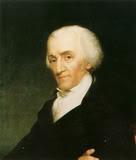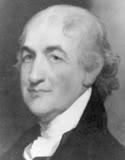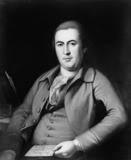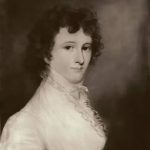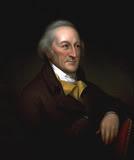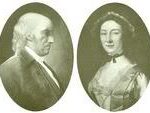Wife of Declaration of Independence Signer Elbridge Gerry
Elbridge Gerry
James Bogle, Artist
Ann Thompson was born on August 12, 1763, and was educated in Europe. She was the daughter of Catharine (Walton) and James Thompson, a wealthy New York mechant from an old and highly honored family. Ann’s grandfather, Jacob Walton, first married Maria Beekman and later Polly Cruger. Both wives were members of distinguished colonial families in New York.
Elbridge Thomas Gerry was born in Marblehead, Massachusetts, on July 17, 1744, the third of Thomas and Elizabeth Greenleaf Gerry’s eleven/twelve children. A former ship’s captain who emigrated from England in 1730, Thomas Gerry was a pillar of the Marblehead community, serving as a justice of the peace and selectman and as moderator of the town meeting. The family was prosperous, thanks to a thriving mercantile and shipping business and an inheritance from Elizabeth Gerry’s side of the family.
Early Life
Young Elbridge was probably educated by a private tutor before his admission to Harvard College in 1758. Like many of his fellow scholars, he paid careful attention to the crisis that would eventually precipitate the American Revolution, arguing in his master’s thesis that the colonists were justified in their resistance to “the new Prohibitory Duties, which make it useless for the People to engage in Commerce.”
Gerry had planned to become a physician, but soon after graduating from Harvard in 1762, Gerry joined his father and two brothers in the family business, exporting dried codfish to Barbados and Spain. In the process, he carved out a considerable fortune for himself as a merchant, and eventually became one of the wealthiest merchants in Marblehead.
Early Political Career
A thriving port and commercial center, Marblehead was a hotbed of anti-British activity during the 1760s and 1770s. Elbridge Gerry joined a Marblehead social group that became increasingly political as Massachusetts felt the impact of Britain’s restrictive policies toward the American colonies. In 1770, he served on the local Committee of Inspection to enforce the boycott of the Townshend Acts, and two years later, he helped Samuel Adams in setting up Committees of Correspondence.
With John and Samuel Adams, Gerry made up the patriot triumvirate in the Massachusetts Bay Colony. Gerry was elected to the Massachusetts General Court in May 1772, and later to its successor, the Provincial Congress, serving as chairman of the committee on supplies during the fall and winter of 1774-1775. There he met Samuel Adams, with whom he immediately bonded. Gerry used his procurement skills as a shipping merchant to help the colonists in their revolt against England’s King George III.
Historian Mercy Otis Warren later recalled that Gerry coordinated the procurement and distribution of arms and provisions with “punctuality and indefatigable industry,” an effort he would continue while serving in the Continental Congress.
Following a practice that was neither unusual nor illegal at the time, Gerry awarded several supply contracts to his family’s business. But, unlike many of his fellow merchants, he refused to take excessive profits from wartime commerce, explaining that he would “prefer any Loss to the least Misunderstanding with the public relative of Interest.”
Gerry became militantly anti-British early on. He opposed British efforts to place judges out of reach of public control, to send Anglican bishops to America, and to enlarge the royal civil and military establishment in the Colonies. He was equally hostile to popular democracy: when Marblehead mobs in 1774 destroyed a local hospital he had helped establish, Gerry denounced the “savage mobility” and withdrew from politics.
Gerry returned to public life when the Parliament closed the port of Boston in June 1774, and Marblehead became a major port of entry for supplies donated by patriots throughout the colonies to relieve the Bostonians, and Gerry helped transport the goods. He organized the relief effort and sought to prevent profiteering. He resumed his place on the local Committee of Correspondence and became one of the leading figures in the Provincial Congress.
On the night of April 18, 1775, Gerry attended a meeting of Patriots at Arlington, Massachusetts, between Cambridge and Lexington. On that famous night when Paul Revere made his famous ride, Gerry and two American colonels went to sleep at the town’s Black Horse Tavern after the meeting. In the middle of the night, a detachment of British soldiers stopped to search the inn for traitors, and Gerry and his companions escaped in their night clothes and hid in a nearby cornfield. They would lie on the cold ground in their nightclothes for several hours, waiting for the soldiers to leave.
During the remainder of 1775, Gerry remained in Boston, helping to raise troops and supplies for the Provincial army. Gerry submitted a proposal in the Provincial Congress for a law to encourage the fitting out of armed vessels. For a colony to authorize such an act was rebellious if not treasonable. John Adams pronounced this law one of the most important measures of the Revolution. Under its provisions, Massachusetts vessels captured a number of British ships, procuring cargoes and supplies needed by the colonies.
With the Revolutionary War under way, Gerry was elected to the Second Continental Congress in December 1775, serving until 1780 and again from 1783 to 1785. He took his seat on February 9, 1776, and worked hard to prepare his colleagues for separation from Britain. He urged state taxes adequate to maintain a stable currency and preserve public credit, and to create an effective military establishment. Gerry would become known as one of the boldest spokesmen for Independence in the Congress.
If he was, as his biographer George Athan Billias admits, a “second rank figure” in a body that included such luminaries as Thomas Jefferson and John and Samuel Adams, Gerry was also a diligent legislator. His efforts to persuade wavering middle colony delegates to support independence during the summer of 1776 evoked praise from John Adams. “If every Man here was a Gerry,” Adams claimed, “the Liberties of America would be safe against the Gates of Earth and Hell.”
Gerry cast his vote for independence but was absent from Congress on August 2, the formal day of the signing of the Declaration, and did not place his signature on the document until November 19, 1776, after his return. The Revolution was Gerry’s defining moment, and he considered the signing of the Declaration of Independence the greatest single act of his entire life.
All of his subsequent actions, as inconsistent and idiosyncratic as they may have appeared to others, were driven by his single-minded goal of preserving the hard-won gains of the Revolution. He considered the new national government under the Articles of Confederation “the finishing stroke of our Independence.”
Until 1779, Gerry sat on the Congressional Treasury Board, which regulated Continental finances. An Army procurement agent as well as a merchant-supplier, he utilized information he obtained in Congress to benefit his own lucrative business. Yet, he also denounced profiteering and personally adhered to a fair-price schedule. In 1780, as wartime financial problems mounted, however, the delegates wanted to revise the schedule. Gerry’s vehement objections led to a quarrel, and he stormed out of Congress. Although still a member, he did not resume his seat until 1783.
Back in Congress in the years 1783-85, Gerry numbered among those who had possessed talent as Revolutionary agitators and wartime leaders, but who could not effectually cope with the painstaking task of stabilizing the new national government. He was experienced and conscientious but created many enemies with his lack of humor, suspicion of the motives of others, and an obsessive fear of political and military tyranny.
Family Life
On January 12, 1786, Elbridge Gerry married Ann Thompson. with whom he returned to Massachusetts. He had remained a bachelor until the age of forty-one; Ann was twenty-two. Ann gave birth ten times between 1787 and 1801. Three sons and six daughters survived: Catharine, Eliza, Ann, Elbridge, Thomas Russell, Helen Maria, James Thompson, Eleanor Stanford, and Emily Louise.
Gerry retired from business and bought a large confiscated Tory estate in Cambridge, Massachusetts, a few miles from Boston, and moved his family there, introducing his young wife who became almost at once a social favorite. The Gerrys made this their home for the next twenty-eight years.

The Gerry Mansion
Cambridge, Massachusetts
Whatever position he held, whether a member of Congress, Governor of his State, or Vice-President of the United States, Ann Gerry was a fitting partner, and cheerfully and gracefully met the demands of official and social life. Her husband’s biographer says of her, “She possessed considerable force of character and a dignified and gentle manner and she personally oversaw the education and religious training of her children, and inspired them with a strong affection, which was evidenced by their devotion to her in her later years in New Haven.”
In a letter to James Monroe on affairs of state, written by Elbridge Gerry in 1787, there appears this paragraph: “Your sentiments are perfectly correspondent with my own respecting domestic Happiness; it is the only Happiness in this life which in my opinion is worth pursuit. Our little pet [daughter] is named Catharine after its Grand Mama, and is our Mutual delight.”
Postwar Politics
One of four delegates chosen by the Massachusetts legislature to attend the 1787 United States Constitutional Convention, Gerry was, in his biographer’s words, “one of the most active participants in the entire Convention.” A member of the moderate bloc—he was neither an extreme nationalist nor a committed states’ rights advocate—he acted as a conciliator during the first phases of the convention.
Gerry believed that a “natural elite” of able and talented individuals should govern the new nation. As a member of that favored class, Gerry considered public service a responsibility, not an opportunity for personal or financial gain. Like many of his contemporaries, he believed that the ideal form of government was a “mixed” constitution, incorporating in a delicately balanced equilibrium the best features of a monarchy, an aristocracy, and a democracy. A constitution that inclined too much toward any of the three would, Gerry feared, threaten the stability of the government or jeopardize the liberties of the people.
As chairman of the committee that resolved the impasse between the large and small states over representation in the national legislature, Gerry made several impassioned speeches in support of the “Great Compromise,” which provided for equal representation of the states in the Senate and proportional representation in the House of Representatives.
Gerry favored congressional payment of the national debt and assumption of state debts. He expressed fears of excessive democracy and opposed popular election of Congress. But, equally fearful of aristocracy, he demanded annual elections and a clear statement of the powers of the national government. He was one of three men (with George Mason and Edmund Randolph) who refused to sign the Constitution because it did not include a Bill of Rights at that time.
Elbridge Gerry was elected to the U.S. House of Representatives under the new national government, and served in First and Second Congresses from 1789 to 1793. He surprised his friends by becoming a strong supporter of the new government. A conciliatory and moderate legislator, he so vigorously backed Treasury Secretary Alexander Hamilton’s proposals to fund the Revolutionary War debt and to establish a national bank that he was considered a leading champion by the Federalists.
Disillusioned by the increasingly partisan nature of the debate that Hamilton’s proposals generated, Gerry retired at the end of his second term, returning to his estate in Cambridge to attend to his business affairs and to care for his large and growing family. Ann Gerry’s frequent pregnancies—ten births between 1787 and 1801— had placed a severe strain on her health, and Elbridge was needed at home.
Gerry’s retirement lasted for four years. During this period, he came to mistrust the Federalists, particularly their attempts to nurture an alliance with Britain, and sided with the pro-French Democratic-Republicans. In 1796, he served as a presidential elector, supporting his friend and former colleague, John Adams.
In 1797, President John Adams appointed Gerry, along with John Marshall and Charles Cotesworth Pinckney, to negotiate a reconciliation with France, which was on the brink of war with the United States. After representatives of the French government demanded a bribe before they would begin negotiations, Gerry’s fellow commissioners left Paris.
Gerry, who had been meeting privately with the French in an effort to facilitate negotiations, remained behind, believing that accommodation was possible. Talleyrand, the French foreign minister, led Gerry to believe that his presence in France would prevent war. Publication of the details of the so-called XYZ Affair in American newspapers damaged Gerry’s reputation. Attacks on American shipping continued, and a naval war with France ensued.
Gerry returned from France in October 1798. Maligned by Federalists who believed him partial to France, and courted by the Democratic-Republicans for the same reason, Gerry tried to remain aloof from the partisan warfare of the late 1790s, but switched his affiliation to the Democratic-Republican Party in 1800.
Massachusetts Governor
Gerry, never very popular among the Massachusetts voters because of his aristocratic haughtiness, was the unsuccessful Democratic-Republican nominee for governor of Massachusetts in 1800, 1801, 1802, and 1803. After a brief second retirement from politics between 1804 and 1809, he was finally elected Governor of Massachusetts in 1810, and was re-elected in 1811.
As Governor, Gerry followed a moderate policy toward Federalists, but later turned more partisan. In addition to replacing many Federalist officeholders with Republicans, Gerry approved a bill in 1812 to redistrict the state to ensure Republican domination in the state senate.
In response, the Federalists ridiculed Gerry, and coined the pun gerrymander to describe the salamander-like shape of one of the redistricted areas. Governor Gerry’s highly partisan agenda led to his defeat in the April 1812 gubernatorial election.
Vice-President to James Madison
Heavily in debt after co-signing a note for a brother who failed to repay the loan, and saddled with the expenses of a large family, Elbridge Gerry asked President James Madison to appoint him collector of customs at Boston, but Madison had other plans for Gerry.
With the 1812 presidential election fast approaching and the vice-presidency vacant since George Clinton’s death in April, Madison was more anxious to find a suitable running mate than to fill a customs post, and he preferred a candidate who would attract votes in the New England states. Gerry had supported Jefferson’s embargo and Madison’s foreign policy, remaining steadfast after the United States declared war against Great Britain in June 1812. Like Madison, Gerry believed that the war was necessary to protect the liberties that both men had labored so hard to secure during the Revolution.
Although Gerry was certainly no liability, he turned out not to be as valuable an asset as the Republicans had hoped. Of Massachusetts’ 22 electors, only 2 voted for Gerry and none voted for Madison. Yet Madison defeated opposition candidate De Witt Clinton by 39 electoral votes, and Gerry triumphed over Jared Ingersoll of Pennsylvania.
Gerry remained at home in Massachusetts on inauguration day, March 4, 1813, taking his oath of office there from U.S. District Judge John Davis. When the Senate convened at the beginning of the Thirteenth Congress on May 24, 1813, Gerry appeared in the chamber with a certificate attesting to the fact that he had taken the oath of office. The vice-presidency had been vacant for nearly a year by the time Elbridge Gerry took office as the nation’s fifth Vice-President.
Despite his advanced age, frail health, and the threat of poverty brought on by neglect of personal affairs, Gerry served as James Madison’s Vice President in 1813. Gerry was a vice president more to Madison’s liking; Gerry offered a welcome contrast to the independent-minded and cantankerous New Yorker, George Clinton, who had proved troublesome during the president’s first term.
However, Elbridge Gerry found it increasingly difficult to remain impartial in the highly charged atmosphere of the James Madison administration, especially after President Madison became seriously ill in mid-June 1813. Gerry, himself, was in poor health; he had recently suffered a stroke, and old age had withered his slight physique. He strongly supported the War of 1812, although opposition in his native Massachusetts was strong, and the Federalist party, which controlled state governments in New England, refused to help the war effort.
Unpleasant as his Senate duties had become, Gerry still enjoyed the endless round of dinners and receptions that crowded his calendar. With his elegant manners and personal charm, the vice president was a favorite guest of Washington’s Republican hostesses, including first lady Dolley Madison. He maintained an active social schedule that belied his advanced years and failing health, visiting friends from his earlier days, who were now serving as members of Congress or in the administration. He paid special attention to Betsy Patterson Bonaparte, the American-born sister-in-law of Napoleon, whose revealing attire caused a stir wherever she went.
With Madison’s re-election as president and his physical condition much improved by the time the Senate adjourned, Gerry was free to return home. He was absent when the second session of the Thirteenth Congress convened in December and did not return to Washington until early February 1814.
Gerry remained in Washington until the second session of the Thirteenth Congress adjourned on April 18, 1814. He spent the summer of 1814 in Massachusetts, awaiting news of the war effort from Madison.
He found the capital much changed when he returned in the fall; British troops had burned most of the city’s public buildings, including the Capitol, and the Senate would meet in temporary quarters for the remainder of his term. Gerry was still an energetic defender of the administration and of the war, but, by that autumn, his public responsibilities, coupled with and his relentless socializing, had sapped his strength.
Gerry became seriously ill in late November 1814, retiring early on the evening of November 22 and complaining of chest pains the next morning. Determined to perform his public duties, he arrived at the temporary capitol in the Patent Office Building later that morning. Realizing that he was in no condition to preside over the Senate, he returned to his boardinghouse.
Vice-President Elbridge Gerry died suddenly of heart failure on November 23, 1814, in the midst of his term of office as Vice-President and President of the Senate. He was 70 years old.
Gerry’s biographer relates that shortly before he breathed his last, “he drew from his bosom a miniature [of his wife], which he always wore when the original was absent. He spoke of it with an interest to show that, although the surpassing beauty delineated in the picture might have first charmed the imagination, more enduring qualities had left the impress of affection on his heart.”
Members of the Senate, assembling in the chamber at their customary hour and hearing reports of Gerry’s death, sent Massachusetts Senators Joseph Varnum and Christopher Gore to the vice president’s lodgings “to ascertain the fact.” When they returned with confirmation, the Senate appointed five senators to a joint committee “to consider and report measures most proper to manifest the public respect for the memory of the deceased.” The body then adjourned as a mark of respect to its departed president.
On the following day, the Senate ordered that the president’s chair “be shrouded with black during the present session; and as a further testimony of respect for the deceased, the members of the Senate will go into mourning, and wear black crape round the left arm for thirty days.”
Gerry is buried in Congressional Cemetery at Washington, DC. Congress paid his burial expenses, and the Senate passed legislation providing for payment of Gerry’s vice-presidential salary to his financially strapped widow for the remainder of his term, but the House rejected it.
Elbridge Gerry had inherited a large fortune from his father. After his death, it was found that his fortune had been to a great extent sacrificed in the cause of his country. Ann Gerry sold the beautiful home in Cambridge and eventually settled in New Haven.
Not long after Gerry’s death, the United States claimed victory over Great Britain. The young nation received few tangible concessions from the British under the Treaty of Ghent, but a new generation of leaders viewed America’s “victory” in the War of 1812 as a reaffirmation of the ideals that had animated and sustained Elbridge Gerry since the summer of 1776.
While Gerry’s actions might be considered those of a maverick, they can also be viewed as those of a man of principle with independence of thought and action independent of party influence. Dr. Benjamin Rush wrote that he was “a genuine friend of republican forms of government.” Gerry himself said, “I hold it to be the duty of every citizen, though he may have but one day to live, to devote the day to the good of his country.”
In the 2008 HBO miniseries John Adams, Gerry is depicted in the first two episodes, portrayed by Tom Beckett.
Ann Thompson Gerry died on March 17, 1849, in New Haven, Connecticut, and was buried in Grove Street Cemetery there, where many of her children are interred. She was the last surviving widow of a signer of the Declaration of Independence. She is regarded as the second Second Lady of the United States, following Abigail Adams, because Thomas Jefferson, Aaron Burr, and George Clinton were widowers during their tenures as Vice-President.

Ann Thompson Gerry Grave
Grove Street Cemetery
New Haven, Connecticut
The inscription reads:
Ann, the widow of Elbridge Gerry, Vice President of the U.S. His name is immortalized on the Declaration of the country’s Independence; hers in the transcendant virtues of domestic life both are embalmed in the veneration of their children.
SOURCES
Ann Gerry
Elbridge Gerry
Ann Thompson Gerry
Elbridge Gerry 1744-1814
Wikipedia: Elbridge Gerry
Elbridge Gerry: Massachusetts
A Biography of Elbridge Gerry
Signer of the Declaration of Independence
Delegates to the Constitutional Convention
Vice Presidents of the United States – PDF File
